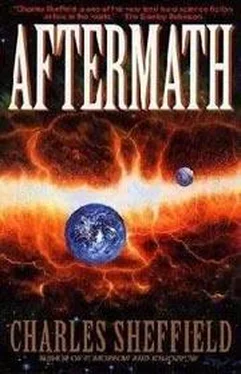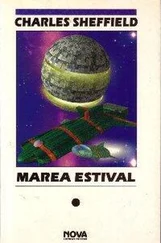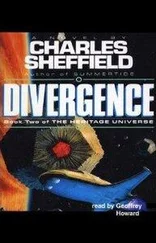He sat down at the web controller in the corner. To this point came all his global feeds. Before Supernova Alpha he could watch, in real time, events in almost every city in the world. Now, like Mother, he was blind.
Or almost blind. The light for the White House security system was blinking. There seemed little point in watching places he could walk to in a minute, but he flicked idly from floor to floor. Quiet, empty rooms, calls being taken from around the country and the world, guards drowsing over cups of coffee.
The surprise came from an unexpected place. In a room on the second floor, the two visitors who had removed Oliver Guest from the syncope facility were having sex.
Saul switched displays at once — this wasn’t a security issue, and they clearly had no idea the room was monitored. But in that moment he had noticed their faces. Faces were his thing, they said far more than words. The two were sharing feelings that went beyond physical sensation. What he read was sorrow and comfort and reassurance. As the display roamed on through the rest of the floor, Saul remembered that closeness.
He arrived for the briefing fifteen minutes early, but the War Room was set up and the other participants were present and waiting. When you are President, other people’s time is yours. Meetings begin when you are ready, and end when you say so. There is, of course, an unfortunate corollary. When you are President, almost all your time is spent on someone else’s problems.
The agenda called for General Grace Mackay to lead the presentation. She provided a thirty-second introduction and handed over to Madeleine Liebchen.
The move from Indian Head to Washington had done nothing to improve the blond doctor’s social skills. Saul received a scowl of recognition, followed at once by the opening words, “The first chart provides an estimate of military strength, by country and category, as of January 1, 2026.”
No welcoming smile, no morning greeting — but also no posturing and no waffle. Half his cabinet could use a lesson from Madeleine Liebchen on the effective use of time. Saul hunched down in his seat, concentrated, and tried to absorb the torrent of facts. He had a reputation as a quick study. He didn’t care what the assortment of staff colonels thought, but he was damned if he’d look like a monkey in front of Grace Mackay and La Belle Dame Sans Merci.
The meeting was scheduled to last for one hour. Madeleine Liebchen, presumably on orders from Grace Mackay, spoke her final word precisely on the thirty-five-minute mark. Long before that, Saul was feeling a profound discomfort. Not because he had not understood the briefing, but because he had.
“That’s it?” he said, when she gave him a final scowl and sat down.
“Unless you have questions.” General Mackay spoke with a straight face. Saul was not fooled. Unless? She knew he would have a thousand. She had deliberately left lots of time in the hour.
“I’m going to tell you what I heard,” he said slowly, “and you can tell me when I go wrong.
“Our earlier estimates of this country’s military strength were too pessimistic. We are helped today by four main factors — two of which I would normally deplore. First, our deep sea and deep underground resources were shielded from EMP effects and survived intact. Second, our military bases, for reasons of historical pride and respect for the past, hung on to weapons superseded by newer technology. Third, a continuing interservices rivalry produced great redundancy of fighting equipment. And fourth, intelligence community information storage, in protected Prospero environments, illegally duplicated and maintained many civilian data bases.”
General Mackay said, “That is correct, sir.” Dr. Liebchen raised one blond eyebrow.
Saul took that for assent and continued, “On the other hand, our earlier estimates of foreign war-fighting potential were made in the absence of facts. Now that we have those facts from overseas, we see reduced foreign capacity in every area, civilian and military. A few days ago, Dr. Liebchen told me that on the basis of her analysis — which she made single-handed — our relative strength in the world had improved by forty percent. You are now telling me that is much too conservative. A better number is more than a hundred percent. As a country we are over twice as strong, relatively speaking, as we were before Supernova Alpha.”
“Yes, sir.”
“Thank you. I have no questions.” Saul stood up. His three security guards stood up with him. “I need to think about all this.”
“It’s good news, Mr. President,” Grace Mackay volunteered.
“It may be. But remember: ’Democracy is the worst form of government except all those other forms that have been tried.’”
She looked at him uncertainly. “Disraeli?”
A fair guess, given Saul’s interests. But Madeleine Liebchen gave the general a glance of infinite pity and said sharply, “No, Grace. Winston Churchill.”
Saul continued out of the room. Sometime he would like to be present when those two were working together. When they were not bickering, they clearly did work together — and he suspected they did so with mutual respect and admiration. How long had he known General Mackay before he had dared to call her Grace?
Humans — present company not excepted — were strange animals.
But Grace Mackay and Madeleine Liebchen, without meaning to do so, had presented Saul with a terrible problem. They had no idea what he meant when he made his final remark. But he did. The overwhelming military and industrial strength of the United States was the worst situation, except for all the other options. It pointed the way to awful possibilities. Sarah Mander and Nick Lopez, and however many others in Congress they had recruited to their ideas, had a real case. If any moment in history offered the chance of maximizing the country’s influence and power in the world, here it was. It could be done. That was the terrifying message of the briefing.
Next on Saul’s agenda was a meeting with his agriculture commission. He made the right noises and nodded in all the right places, but his mind was elsewhere. Pax Americana. An American global outreach, industrial, political, and where necessary, military. It was immoral, but could you stop it? When you were on the wrong side of the argument, you could delay but you could not prevent.
The agriculture session was important, but he was delighted when it ended and he was free to escape.
Yasmin, groveling on the floor of his private office, completed the morning’s surrealism. She clutched a mess of papers to her chest and stared at him with tawny, nervous eyes.
“I found out about Tricia.” She held printed pages out toward him. “I know what she was doing, why she left you.”
It took a few moments to realize that she was talking two years and not two nights ago. As Yasmin revealed what she had discovered, his spirits sank. The third blow of the day. His mother; the evidence that a global Pax Americana was possible technically, if not morally; and now this.
Yasmin might think she had proof beyond doubt about Tricia. Maybe she did. She was surely excited, relishing the description of her detective work. But Saul was not ready to accept her conclusion. Not ready to believe it. The passion, the heady excitement for each other, Tricia’s absorption in everything he did, all that could not be faked. But — she had married Rumford Leighton and Bobby Beacon and Willis Chartrain and Joseph Goldsmith. Had they, too, enjoyed Tricia’s blazing passion and focused affection?
It wasn’t something Saul wanted to think about right now. He was relieved when Yasmin told him about the Mars expedition, throwing it in almost as a by-the-way. He forgot his own troubles.
Читать дальше












